| 22 Nov 2023 | 9:00 - 18:00 | Various (see programme) | |
- Description
- Programme
- Speaker biographies
Description
Symposium and roundtable
Convenors
- Nicolò Crisafi (Pembroke College, University of Cambridge)
- Orsolya Katalin Petőcz (Selwyn College, University of Cambridge)
Speakers
- Jennifer Burns (University of Warwick)
- Matteo Botrugno (Artist, filmmaker)
- Daniele Coluccini (Artist, filmmaker)
- Elliot Evans (University of Birmingham)
- Anna Hájková (University of Warwick)
- Mara Josi (University of Ghent)
- Hervé Joseph Lebrun (Photographer, filmmaker)
- Linda Roland Danil (University of Cambridge)
Summary
‘I don’t like the word homophobia. I myself say fascism.’
– Pierre Seel, concentration camp survivor (1923 – 2005)
The Holocaust is not immune to canonisation, as scholars such as Dominick LaCapra have pointed out, and some testimonies are regularly excluded from the official conversation. Artistic and literary practices attest to processes of exclusion and violence and give voice to those that experience them. In this spirit, filmmakers Matteo Botrugno and Daniele Coluccini have strived in their latest work, C’è un soffio di vita soltanto, to amplify the voice of Lucy Salani, a trans woman who survived Dachau; in France, photographer and filmmaker Hervé Joseph Lebrun has worked with Pierre Seel to interrogate processes of invisibilisation and visibilisation. In these ways, these artists set up forms of subversion and resistance to normative canonised narratives. The event seeks to bring to the fore such marginalised and non-conforming voices, from those of Holocaust survivors to that of contemporary artists.
Homophobia, queerphobia and transphobia did not end with the Second World War. Their spatio-temporal extension to the present and across national boundaries necessitates that we work across disciplinary boundaries and without the confines of academia.
The two-day event will begin with the UK premiere of Botrugno and Coluccini’s critically acclaimed C’è un soffio di vita soltanto, which tells the story of Dachau survivor Lucy Salani.
On the second day, a panel of academics from different fields will explore questions of testimony; a roundtable will then bring together discussants from inside and outside academia, for a conversation that crosses national borders.
This event brings together artists and academics with the aim of discussing queer and trans testimonies from the Holocaust to the present.
Film screening
As part of this event, there will be a film screening of ‘C’è un soffio di vita soltanto / A breath of life (2022)’ followed by a Q&A with the film’s Directors, Matteo Botrugno, Daniele Coluccini (dir.) on 21 November.
Booking is via the Cambridge Arts Picturehouse.
If you have specific accessibility needs for this event please get in touch. We will do our best to accommodate any requests.
Supported by:
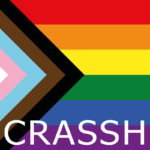
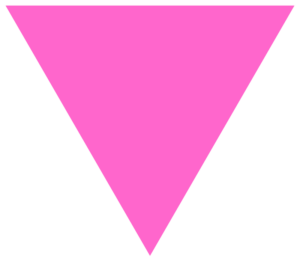

![]()
Programme
Academic panels |
|
| 9:30 - 11:00 | Panel 1
Chair: Nicolò Crisafi |
| 11:00 - 11:30 | Refreshment break |
| 11:30 - 13:00 | Panel 2
Chair: Robert S. C. Gordon |
| 13:00 - 14:30 | Sandwich lunch |
Afternoon screening and talks Trinity College, Adrian House Seminar Room, Burrell’s Field, Grange Road, CB3 9DH |
|
| 14:30 - 15:30 | Film screening and conversation
Conversation with filmmaker Hervé Joseph Lebrun about survivors Pierre Seel and Albrecht Becker. |
| 15:30 - 16:30 | Keynote speech
Anna Hájková
|
| 16:30 - 17:00 | Break |
| 17:00 - 18:00 | Final roundtable
|
Speaker biographies
Matteo Botrugno and Daniele Coluccini (Artists, filmmakers)
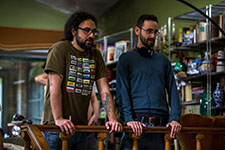
From left to right: Matteo Botrugno and Daniele Coluccini. Photo © Blue Mirror with kind permission of Matteo Botrugno and Daniele Coluccini
Matteo Botrugno and Daniele Coluccini made their debut in 2009 with the feature film Et in terra pax (And Peace on Earth) after both graduated in Film History and Critical Studies in 2005 with a further interest in music. And Peace on Earth had its premiere in 2010 at Venice Film Festival – Venice Days and was selected in more than fifty festivals worldwide, including Tokyo International Film Festival and Moscow International Film Festival. It received a special mention at the Nastri d’Argento award (the Italian National Syndicate of Film Journalists award) in 2011 and was distributed in Italy to movie theaters by Cinecittà Luce and in Home Video by Cecchi Gori Distribution. Their screenplay Rite of Spring was selected in the ‘New Cinema Network’ contest, part of the Rome International Film Festival as well as film festivals in Berlin and Buenos Aires. It was selected for the Sundance Mediterranean Screenwriters Workshop 2016. In 2017 they directed IL CONTAGIO (Tainted Souls), the first Walter Siti’s book-to-film adaptation. In 2021 their third film premiered at the Torino Film Festival. C’è un soffio di vita soltanto (A Breath of Life) is the story of Lucy Salani, the oldest Italian transsexual woman among the few survivors of Dachau concentration camp. The film was released in theaters at the beginning of 2022.
Jenifer Burns (University of Warwick)

Jennifer Burns is Professor of Italian Studies at the University of Warwick. She specialises in Italian literature and culture from the 1980s onwards, particularly in transnational narrative forms in the Italian context, including narratives of migration (Migrant Imaginaries, 2013), postcolonial, and minoritized experience. Both independently and as Co-Investigator in the large AHRC-funded research project, ‘Transnationalizing Modern Languages’ (2014-18), her recent work explores the affordances of adopting a transnational ‘optic’ to approach literary production and practices. Among the outcomes of this research is Transnational Modern Languages: A Handbook, co-edited with Derek Duncan (2022). Her current project uses this perspective to explore constructions of the individual subject in narratives of often traumatic lived experience.
Nicolò Crisafi (Pembroke College, University of Cambridge)
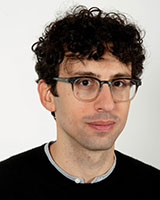
Nicolò Crisafi is Research and Teaching Fellow in Italian and Director of Studies in Modern Languages at Pembroke College, Cambridge. He researches narrative theory, affect, and reader’s responses in Italian literature, with a special focus on the works of Iacopone da Todi, Dante, and Boccaccio. He has presented and published on women’s voices, witnessing, performativity, and vulnerability. His monograph Dante’s Masterplot and Alternative Narratives in the ‘Commedia’ (Oxford: OUP, 2022) explores paradoxes, detours, and open-ended futures as alternatives to the dominant narrative in the Commedia: the telelogical ‘masterplot’. He is book reviews editor for pre-1700 works at Italian Studies.
Elliot Evans (University of Birmingham)
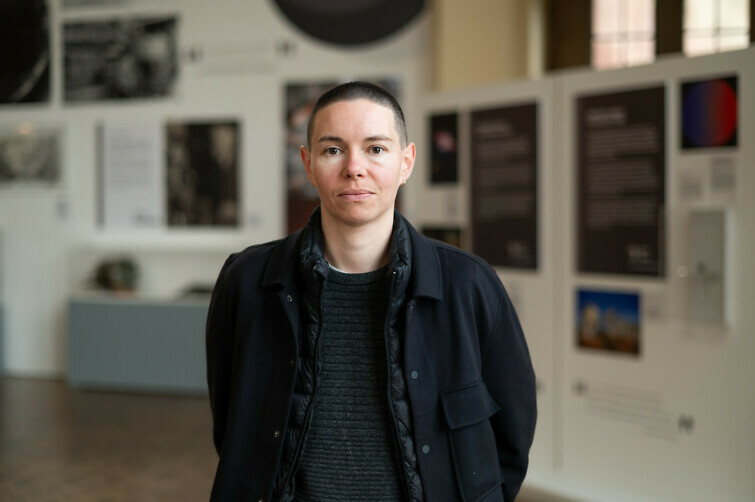
© Victoria Beddoes
Elliot Evans is Associate Professor in the Department of Modern Languages, University of Birmingham. Elliot is the author of Queer Permeability: The Body in French Thought from Wittig to Preciado (2020). Their research is concerned with the varied constructions of sexuality and gender across cultures, engaging variously with queer, feminist and transgender theories. Their work has also been concerned with the biopolitical management of bodies and illness, not just by states but in the interests of neo-colonialism and global capitalism, and examines and the ways in which this is elaborated through writing and visual production.
Their current research project is a comparative analysis of the visual language of HIV/AIDS across four national contexts: Democratic Republic of Congo, France, Haiti, Québec, specifically looking at experimental film and video art.
Anna Hájková (University of Warwick)
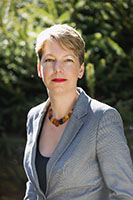
Photo © Václav Jirásek
Anna Hájková is Reader at the University of Warwick. Her book, The Last Ghetto: An Everyday History of Theresienstadt, came out in 2020 with Oxford University Press. She has also published three short books: in addition to a coauthored book on the Veit Simon family, she also edited family wartime diaries from the Communist resistance in the Holocaust, and in 2021, published Menschen ohne Geschichte sind Staub with Wallstein publishing house, on queer teenagers in the Holocaust. The book is coming out as People Without History are Dust in an expanded English translation with the University of Toronto Press.
She is currently working on two projects: a study of transgressive sexuality in the Holocaust, for which is writing a trade book on the Neuengamme guard Anneliese Kohlmann and her relationship with a woman prisoner. She is also working on a generational history of a Communist generation in Central Europe, 1930-1970. Her work on queer history of the Holocaust was published in Czech, German, British, US American, and Israeli newspapers. She has edited a special issue of German History “Sexuality, Holocaust, Stigma.”
Hervé Joseph Lebrun (Photographer, filmmaker)
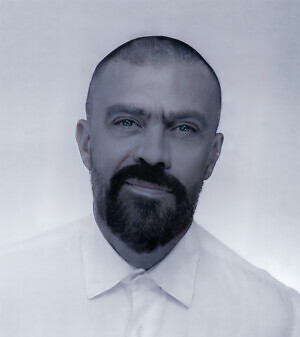
Photo © Hervé Joseph Lebrun
Hervé Joseph Lebrun is a photographer and filmmaker. He has primarily worked on the deportation of homosexuals. He collaborated with Albrecht Becker, one of the last German survivors of the persecution of homosexuality for 4 years between 1998 and 2002. He wrote De Pierre et de Seel (2000) with Pierre Seel, the only survivor of the persecution of homosexuality in France to have testified openly. From 2010 to 2017, he was the director of the Paris LGBTQI film festival Chéries-Chéris.
Lebrun is also a specialist of 70s French pornography, he studies and safeguards the work of François About, Norbert Terry, Jacques Scandelari, Jean-Étienne Siry, Wallace Potts, Anne-Marie Tensi, Benoît Archenoul, Francis Savel and Jean-Michel Sénécal. He made the full length documentary film Mondo Homo: A Study of French Gay Porn in the ’70s (2014) which was screened at the San Francisco Frameline (2014), at the Geneva Everybody’s Perfect Festival, at LUFF in Lausanne, at Queer Lisboa (2014), at the Guadalajara international film festival (2015). Lebrun has made 12 experimental short films, amongst them Albrecht Becker, Arsch Ficker Faust Ficker (2004), 8 min, Le Nicoeur (The Heartscrewer) (2005), 17 min and Possession (2007), 24 min.
Lebrun has had exhibitions of his work across Brussels, Berlin and Zagreb and his exhibitions have been the subject of publications. These exhibitions include: Albrecht Becker, Arsch Ficker Faust Ficker, Galerie Guillemites 9 (Paris: 1999); Mon beau gars l’est, Guillaume Dustan (Sujet Dustan: Sodomie électrique), Pause-Lecture (Paris: 2000); Libidinal Motion / Diary of an Innocent, Albrecht Becker’s autoportraits, Delmes & Zander (Cologne: 2018), Albrecht Becker. No Love Without Pain, Independent Art Fair, Delmes & Zander, (New York: 2019); the collective exhibition Champs d’amours, 100 ans de cinéma arc-en-ciel (Hôtel de Ville, Paris, June – September 2019) and When We Were Monsters, photomontages of Albrecht Becker, collective exhibition with curator James Richards (Haus Mödrath – Räume für Kunst, Kerpen, Germany: February 2021 – June 2022).
Mara Josi (University of Ghent)
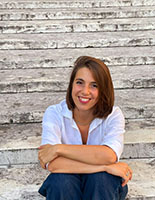
Mara Josi obtained her PhD at the University of Cambridge. Before joining the University of Ghent as an FWO Postdoctoral Fellow, she was an IRC Postdoctoral Fellow at University College Dublin and a lecturer at the University of Manchester.
Her first monograph, Rome, 16 October 1943. History, Memory, Literature, is devoted to the literary production of the largest single round-up and deportation of Jews from Italy (Legenda, 2023).
Mara is currently working on a project which reorients the study of Italian Holocaust-related literary production by defining and investigating a new category of it: “the literature of hiding”, which consists of texts by Jewish authors that bear witness to the experience of living in hiding to escape deportation. She examines the extent to which “the literature of hiding” can reshape the understanding and recollection of discrimination and persecution in Italy and broaden the discourse of the transmission and recollection of Holocaust-related experiences in Italy.
Orsolya Katalin Petőcz (University of Cambridge)
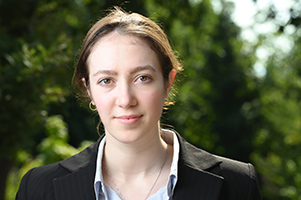
Photo © Székelyhidi Zsolt
Orsolya Katalin Petőcz is a PhD student at the University of Cambridge. She explores queer testimonies across literature and the visual arts. She focuses primarily on the testimonies of survivors of World War II and studies the early texts of queer and trans theories in the context of which these testimonies emerge. Testimony and exile are returning themes of her work. Petőcz organises events in line with her research interests, amongst these is the Cambridge-based Queer Cultures Colloquium. Petőcz has published research articles in French Cultural Studies and in Journal of Italian Cinema and Media Studies. Petőcz is the co-editor, with Naomi Segal, of the volume Dwelling: Cultural Representations of Inhabited Spaces (under contract with Palgrave Macmillan for publication in 2024, based on the Cultural Literacy Everywhere Symposium 2022).
Linda Roland Danil (University of Cambridge)
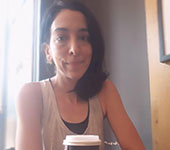
Linda Roland Danil completed her PhD at the School of Sociology and Social Policy at the University of Leeds in 2010, where she was awarded a full scholarship to pursue her doctoral studies. Since then, she has published a number of sole-authored articles and acted as guest editor for a number of prestigious journals. Her work is interdisciplinary in nature and encompasses gender and sexuality studies, medicine, law, art and art history, sociology, and military history, amongst others. She is presently a Visiting Researcher in the Department of Surgery, University of Cambridge, where she is also writing a second thesis.



